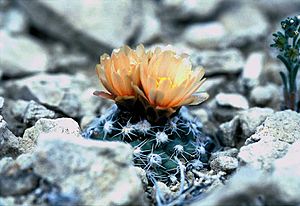Winkler's cactus facts for kids
Quick facts for kids Pediocactus winkleri |
|
|---|---|
 |
|
| Flowering Pediocactus winkleri in April in Utah. | |
| Conservation status | |
| Scientific classification | |
| Kingdom: | |
| (unranked): | |
| (unranked): | |
| (unranked): | |
| Order: | |
| Family: | |
| Genus: | |
| Species: |
P. winklerae
|
| Binomial name | |
| Pediocactus winkleri K.D.Heil
|
|
The Pediocactus winkleri, also known as Winkler's cactus or Winkler's pincushion cactus, is a small type of cactus. It is special because it is only found in the state of Utah in the United States. You can find it in just two counties there: Emery and Wayne Counties.
This cactus looks like a small, ribbed ball. It has short spines, about 9 to 14 of them, each only 1.5 to 4 millimeters long. Its flowers are a pretty peach to pink color. The Winkler's cactus can handle cold weather and grows naturally on sandy hilltops and slopes that are high up.
Contents
Discovering Winkler's Cactus
This unique cactus was first found in the early 1960s. A woman named Mrs. Agnes Winkler, along with her teenage son, Jim Winkler, saw it while traveling in an area of Utah called the San Rafael Swell.
A botanist named Dr. Lyman Benson had previously identified a similar cactus in Arizona in 1958, called Pediocactus bradyi. For a while, people thought the cactus Mrs. Winkler found might be the same.
How a New Species Was Identified
It wasn't until 1979 that another botanist, Ken Heil, realized that the cactus Mrs. Winkler found was actually a completely new species. The Winklers had first noticed the cactus during a trip to Capitol Reef.
When Mrs. Winkler returned home to New Mexico, she sent a letter to Ken Heil. She included a picture of the cactus and described where she found it. Heil, who was already studying plants in southern Utah, was able to find the cactus population based on her description.
Protecting Winkler's Cactus
The Pediocactus winkleri was officially listed as a threatened species on August 20, 1998. This means it is at risk of disappearing if we don't protect it.
Why This Cactus Needs Protection
One of the biggest dangers to this cactus, like many other cacti, is people illegally taking them from the wild. This is called poaching. Another threat comes from off-road vehicles that can damage the places where these cacti grow.
It is very important that cacti like P. winkleri are only grown from seeds or plants that have been obtained legally. They should never be taken directly from their natural habitat.
 | Jewel Prestage |
 | Ella Baker |
 | Fannie Lou Hamer |


